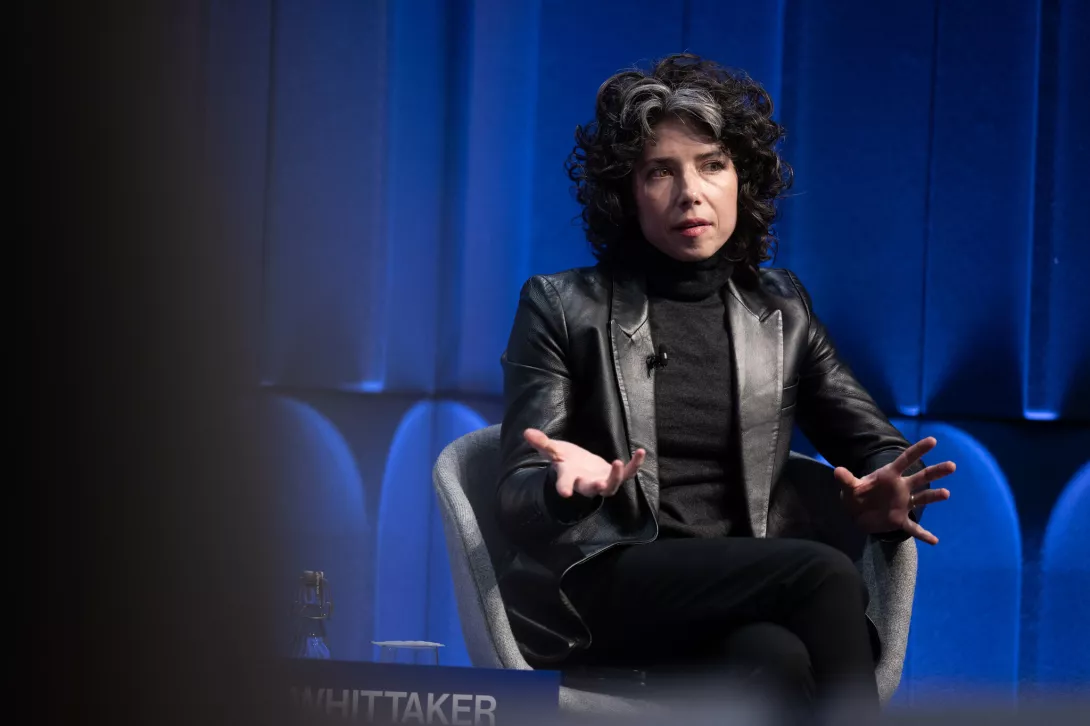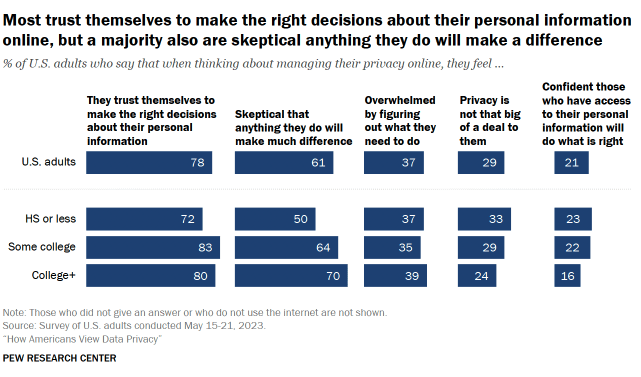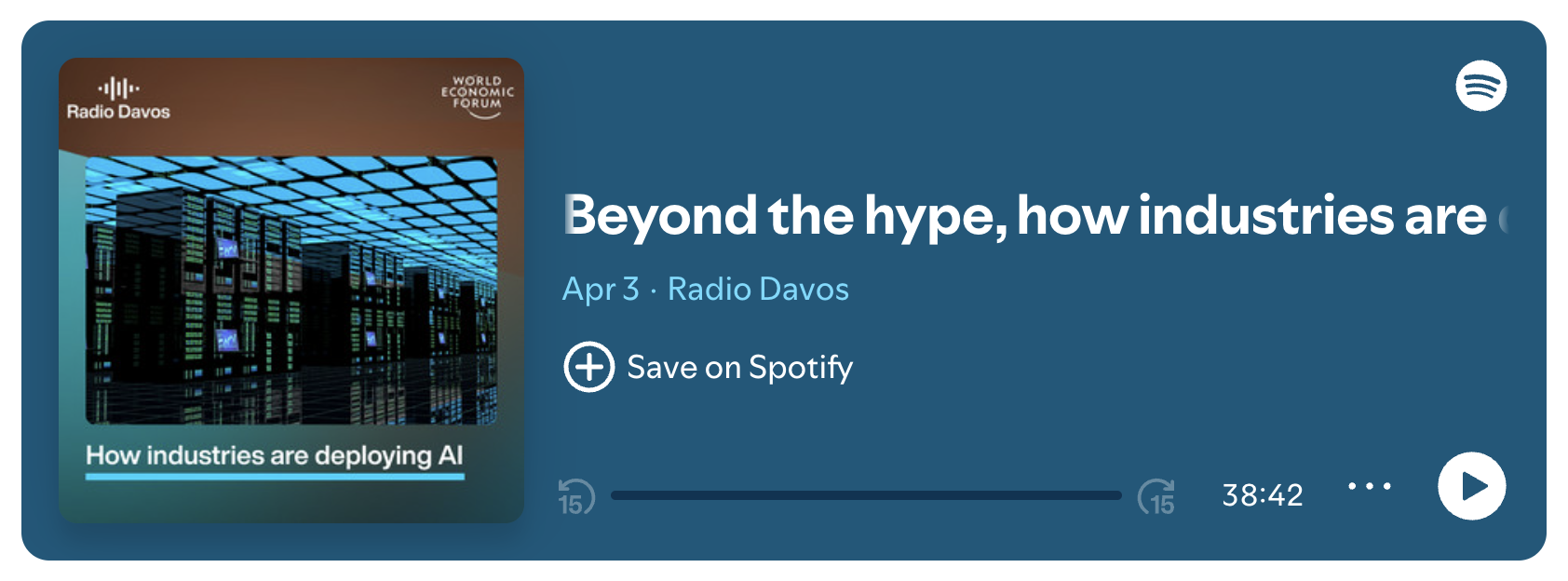
Signal is increasing in popularity in Europe and the US as an alternative to other messaging services. Image: World Economic Forum / Mattias N
This article is part of:Centre for the Fourth Industrial Revolution
- Research from the World Economic Forum shows it’s becoming easier for citizens to be monitored, allowing governments, technology companies and threat actors to “reach deeper into people’s lives”.
- In response, people are “waking up” to privacy, according to Meredith Whittaker, president of secure messaging service Signal.
- Here, she explores the drivers behind this shift and how it could impact the digital landscape.
People are waking up to privacy. That’s the view of Meredith Whittaker, who – as you might expect from the president of not-for-profit secure messaging service Signal – has strong views on the state of online security and confidentiality.
“This is not something that people have forgotten about or given up on,” she says. “It’s something that has eroded around us in a way that is not always consensual.”
In the past five years, Whittaker has started to see people “really valuing privacy” – unsurprising when you consider that two-thirds of the world’s population is now online, with the majority using social media.
As the 2025 Global Risks Report from the World Economic Forum cautions, advancing technology and expanding digital footprints are making it easier to monitor citizens, allowing governments, technology companies and threat actors to “reach deeper into people’s lives”.
Discover
How is the Forum tackling global cybersecurity challenges?
The World Economic Forum's Centre for Cybersecurity is at the forefront of addressing global cybersecurity challenges and making the digital world safer for everyone.
Our objective is to support individuals and organizations to securely benefit from ongoing digital and technological progress. The independent and impartial platform of the Centre convenes a diverse range of experts from the public and private sectors to reinforce the importance of cybersecurity as a strategic priority and drive global public-private action to address systemic cybersecurity challenges.
Learn more about our impact:
- Cyber resilience: Working with more than 170 partners, the centre is playing a pivotal role in enhancing cyber resilience across industry ecosystems: oil and gas, electricity and manufacturing.
- Partnership against Cybercrime: In collaboration with over 50 partners, the centre is playing a key role in driving public-private cooperation to combat cybercrime through effective insight sharing and collective action.
Want to know more about our centre’s impact or get involved? Contact us.
Data privacy today
“We live in a time where our ability to live lives privately has been slowly eroded by data collection and these, often incredible, technologies that track our locations and our habits,” Whittaker says. “What I stand for and what Signal does is [preserve] the ability and the human right to communicate privately.”
Because it collects very little data about its users, Signal is increasing in popularity in Europe and the US as an alternative to other messaging services. Downloads of the app in the US – where a majority of people say they are concerned about online privacy – were up 25% in the first three months of 2025 compared to the same period the previous year.

Whittaker was speaking to the Forum at the Annual Meeting 2025 in Davos, months before the ‘Signalgate’ controversy, in which it was reported that a US government official using the app had accidentally shared plans for a forthcoming military attack with a journalist.
After the incident, she described Signal, which the company says uses open-source end-to-end encryption to keep conversations secure, as the “gold standard in private comms”.
Being open-source is key to this, she says. “When you are making claims around privacy and security, you need to be open source. You need to let people examine the basis for [your] claims and check your citations.”
Privacy and the rise of AI
Whittaker says the fact that other tech firms, including Meta’s WhatsApp and Apple, are investing in more privacy for their services shows that such solutions are becoming increasingly desirable.
This will only continue as artificial intelligence (AI) tools proliferate and consume increasing amounts of data as they do so. AI is transforming fields such as healthcare, for example, helping with everything from triaging patients to detecting early signs of disease. But there is also a risk of privacy violations and misuse of sensitive data.
“When we're talking about these large models now, that doesn't mean that AI and finding patterns across large amounts of data isn't useful,” says Whittaker, who is also co-founder of the AI Now Institute. “But I think it does mean that we have to recognize that this privacy and AI conversation are often two sides of the same coin – if we care about privacy, we're going to also have to care about how these AI models are developed.”
This means looking at the kinds of data that goes into AI models as well as how models could be used to “perpetuate and amplify surveillance capabilities”, she adds.
Privacy as a fundamental right
Criticism of encrypted services like Signal often focuses on security and whether such apps allow criminals and terrorists to communicate without the threat of their messages being monitored by corporations or authorities.
For Whittaker, who has said Signal would never weaken its security promises, allowing some messages to be scanned could actually create opportunities for criminals to access such systems. It would undermine the trust people place in encrypted services, she adds.
“When people put privacy and security in opposition, I think they really need to check their definitions of security,” Whittaker explains. “There is no security without the ability to question the status quo, to make sure that is robust and to change things that are broken.”
The path forward is to work on getting back to preserving “the norm of private communications that were standard for hundreds of thousands of years of human history before the boom of the Internet economy”, she says.
“Rewarding privacy, rewarding secure data, creating incentives for those things is absolutely a shift that we need.
“I think of privacy from the framework of fundamental human rights, the rights of private communication, to live a private life, to think and do and communicate with who you want.
“We can't build new worlds, we can't imagine new paradigms without that incubation space, without the safety to experiment with ideas and think about what could work or not.”
Have you read?
Why artificial intelligence design must prioritize data privacy
How public-private partnerships can ensure ethical, sustainable and inclusive AI development
Balancing innovation and governance in the age of AI



